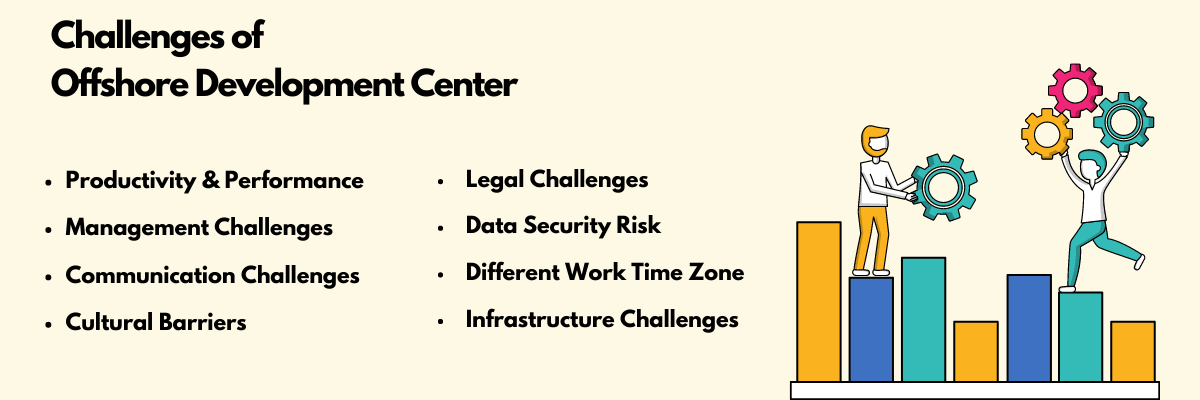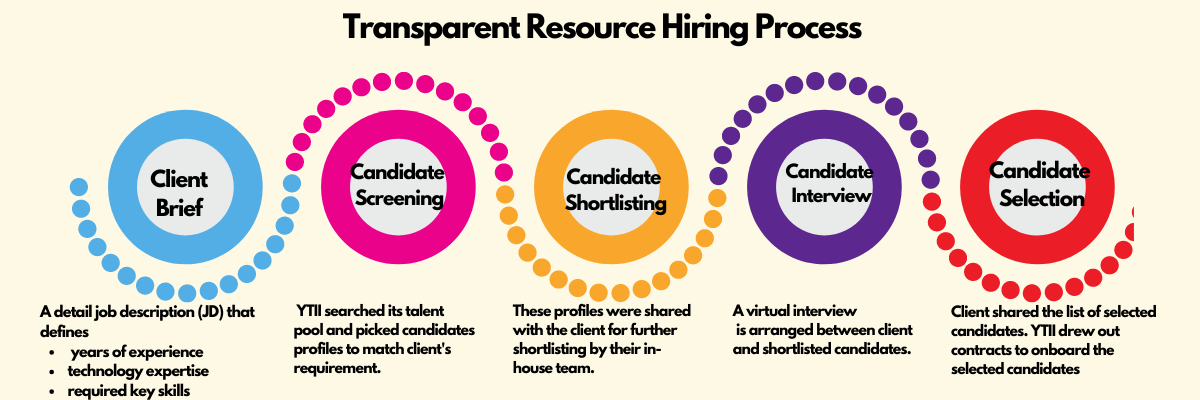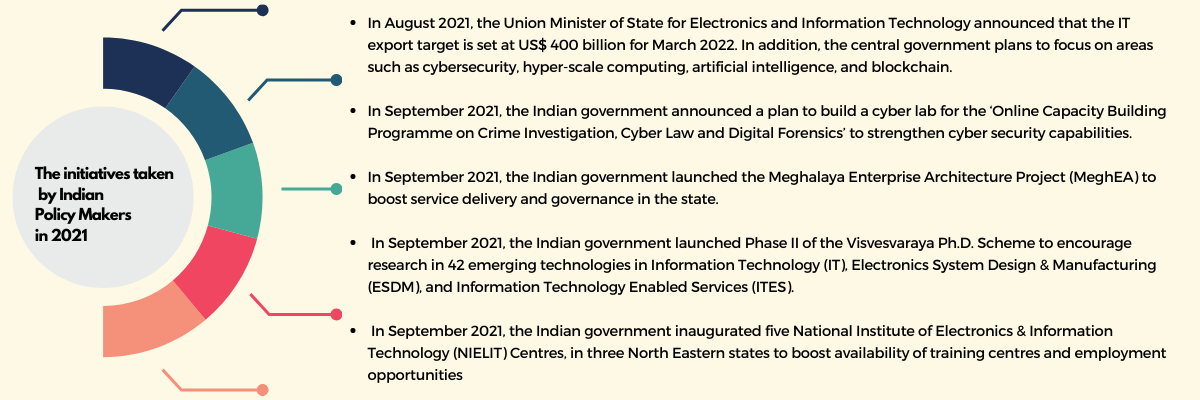
Quick Summary:
Managing an ODC also comes with unique challenges, such as communication barriers, time zone differences, and cultural differences. In this article, we'll explore the top 8 Offshore Development Center challenges and provide solutions to help you overcome them and achieve success with your remote team.
The Global Outsourcing Survey, 2020, conducted by Deloitte, shows the inclination of enterprises from embracing disruptive technologies to return to basics: shoring up value and driving down costs, with a renewed focus on risk management.
With cost reduction being the top priority amongst companies, offshore development center (ODC) has emerged as a go-to solution for businesses globally.
Not only does it help bring down the project cost by as low as 60%, but it also aids in improving project quality by hiring highly skilled resources across the world.
As more and more enterprises are inching towards offshore development centers, they are often facing these challenges.
Related Read: What is Offshore Development Center?
Key Listing
- Communication: Effective communication is essential for offshore development center success. Hire multilingual project managers and establish clear communication protocols.
- Quality control: Consistent quality can be challenging for offshore development centers. Implement a comprehensive quality control process and invest in training and development.
- Security and confidentiality: Data security and confidentiality are major concerns. Implement robust security measures and ensure compliance with data protection regulations.
- Talent acquisition and retention: Attract and retain top talent by investing in employee development and training, providing competitive compensation and benefits packages, and creating a positive work culture.
Top 8 Offshore Development Center Challenges and How to Solve Them
Often, businesses only consider the hourly rate of talent while comparing the development cost. They fail to account for:
- geopolitical issues
- skill availability
- local labor competition
- legal and intellectual property-related issues
- wage inflation
- attrition
- currency fluctuation
which directly or indirectly affects the project cost. Besides, they also face management, communication, culture, legal compliance, and cybersecurity challenges.
So, without any ado, let’s find out these challenges and how to mitigate them.

1. Productivity and Performance Challenges
Businesses frequently face challenges of mismatched expectation vs. reality where the performance of the hired offshore team of developers and the quality of output is below average. This usually occurs when the skillsets of the hired resources don’t tick the boxes of the client’s requirements.
There are performance issues in work efficiency and effectiveness, causing delays in project deliveries. This results in increased time-to-market for new products and delays in the business roadmap.
Solution
This challenge can be mitigated by the below steps:
- Transparency in Hiring– Transparent hiring is the first and most crucial step when selecting an offshore team. So, it’s recommended to choose an offshore partner that is proactively involved in the end-to-end hiring process. Right from screening, shortlisting, and interviewing to selecting resources, they take your inputs and preference into consideration at every step of the way.
Selecting an offshore partner like this would ensure that you hire the right resources that deliver quality output meeting your expectations.

- Customer Support and Assistance– The responsibility of the offshore partner doesn’t end just by providing transparent hiring; they must set up customer support to assist you in proper project deployment.
- Regular Feedback – Choose a partner that creates a process framework that takes regular feedback (weekly/monthly) on output, resources, and ongoing operations. Also, it takes corrective actions to fix issues in case of a mismatch between expectation and delivery.
2. Management Challenges
When working with an offshore developing company, the probability of coming across management challenges arises in the following scenarios:
- Missing a customer-centric attitude, where the partner is keener on the financial aspect of the collaboration than providing you with a proper solution/team on your projects.
- Lack of systems, processes, framework, and escalation matrix
- No resource backup for the hired team
Solution
Businesses can address management challenges by doing a thorough vetting of the offshore partner, where it’s crucial to evaluate the following:
- Their business approach and attitude towards their customers. What kind of solutions and assistance (technical or non-technical) are they willing to provide on your project?
- Evaluate their systems, work processes, frameworks, and escalation matrix. Access their operational hierarchy and if any escalation is raised, how soon would it be resolved relating to the hired team, quality of output, or new skill set requirement?
In today’s volatile time, having a resource backup has become necessary to ensure the project’s uninterrupted development. therefore, choose a partner who can provide quick resource replacement and on-demand upscaling or downscaling of the hired team.
3. Communication Challenges

Working with an offshore development center clearly means managing a remote team overseas. Countries like China, Brazil, Vietnam, Taiwan, and Egypt have emerged as a hotbed for offshoring projects over the past decade; communication still remains a significant challenge while working with an offshore team.
Precisely, communication challenges arise from two aspects:
- Lack of logical and analytical skills– In this scenario, though the team is competent in speaking and understanding the preferred language of communication (usually English), but struggles to understand the briefs due to a lack of required knowledge and skill sets.
Moreover, the team lacks the analytical aptitude to probe the requirement and deliver quality products.
- Lack of language proficiency- In this case, though the team has analytical competency, they struggle due to low English proficiency. English is still not taught as a first or second language in many nations. Lack of language proficiency results in communication gaps between the company and the offshore team.
Therefore, these gaps often result in miscommunication, longer time in debriefing, and lastly, delayed results.
Solution
Businesses can address communication challenges by setting up a rigorous selection process. An efficient selection process can go a long way in mitigating the first challenge. A robust selection process would ensure proper screening, shortlisting, and selection of teams based on their skill set and analytical aptitude. The selection process includes:
- Resume vetting
- Analytical aptitude examination
- Candidate selection interviews in English
Besides the selection process, it is always better to choose an offshore development partner from English proficient country like India. India has the second-largest English-speaking population and ranks #48 in language proficiency worldwide. So, you get access to a proficient English-speaking team from the executive to the management level.
4. Cultural Barriers
Cultural differences are among the most common and evident challenges faced with an offshore team. When working with a diverse group, one is bound to experience language barriers, cultural gaps, differences in beliefs, and working styles.
Sometimes all these cultural differences can be while working with offshore teams within the same nation. These differences can lead to friction between in-house and offshore teams, affecting their ability to collaborate and deliver quality output.
Solution
Understanding the team’s cultural diversity, beliefs, and emotional quotient can go a long way in mitigating cultural barriers while working with a diverse team. It is essential to do your homework and check the cultural compatibility of offshore development companies at the corporate level, process level, and day-to-day interaction level before hiring them as your offshore development partner.
Here are five ways to ensure cultural compatibility between you and your offshore partner.
- Be aware of the professional etiquette of the region you plan to set up your offshore development center.
- Maintain a clear communication channel to encourage transparency and ensure the goals and objectives are conveyed to the offshore partner seamlessly.
- The hired team must undergo proper training and mentoring to avoid confusion, miscommunication, and discord between in-house and offshore teams.
- Create a constructive feedback mechanism that allows teams to communicate and share their inputs openly.
- Be respectful towards their culture, tradition, and beliefs, and avoid blindly replicating your business model to the offshore development center.
5. Legal Challenges
Businesses get influenced by politics, policies, laws, and international relations. Factors like taxes, labor law, FDI regulations, import and export policies, wage inflation, attrition, and legal landscape are critical and directly and indirectly impact the success of your Offshore Development Center in a foreign country.
Solution
It is essential to do an in-depth analysis of a country’s legal landscape, foreign business policies, FDI regulation, and geopolitical issues before you decide to set up an Offshore Development Center. India is one such nation that has one of the most favorable investment environments for the IT sector and invests heavily in creating the right talent pool to invite foreign investment in these sectors.

6. IP Protection and Data Security Risk
IP Protection and Data Security are two major concerns businesses face while offshoring their IT projects. Let us understand the difference between IP Protection and Data Security.
- Data Security
This refers to data safety against an outside threat or malware. It is an intersection of three principles: confidentiality, integrity, and availability (CIA). Failure in any one of the components leads to data vulnerability resulting in a breach of information, unauthorized access, leakage, or deletion of critical data due to poor policy, risk management, or immature security practice.
- IP Protection
It is defined as protecting sensitive information from inside threats and leakages. Sensitive information like trade secrets, intellectual property (IPs), or financial and operational data that, if leaked, can adversely impact the client’s business.

When working with an offshore partner, businesses feel constant pressure to keep information secure while working remotely.
Solution
One can mitigate the challenges of Data security and IP protection by doing a thorough risk assessment and taking corrective actions before starting the offshore development center. The corrective action includes:
- Building enterprise-grade network security into the infrastructure of the offshore software development center.
- Signing detailed NDAs between the hiring company and offshore partner, hiring company and offshore team, and offshore partner and offshore team to ensure data sanctity.
- Conducting regular security audits for infrastructure, and servers.
- Create a local database of the ongoing project. This would allow you to create backups for the ongoing work at all times.
- Using hardened systems for mission-critical projects.
Related Read: Best Security Framework in Offshore Development Center
7. Infrastructure Challenges
Infrastructure such as internet connectivity and speed, 24×7 power supply, systems and technologies, and voice infrastructure are key components of keeping a remote work model operational. And lack of the same could cause the failure of the offshore development center.
Solution
Though businesses may not be able to mitigate infrastructural challenges, they sure can avoid them by choosing the right location. Here is a small checklist:
- 24×7 Power
- Uninterrupted high-speed Internet Speed
- Systems and technologies are available with the offshoring partner.
- Transportation and connectivity within the city
- Voice infrastructure for international calls
8. Time Zone Difference
While offshoring your projects, one of the most common challenges is the work zone difference between the in-house and offshore teams. Since both teams operate in different time zones, collaboration becomes challenging. Limited interaction between teams creates coordination issues, which can impact the overall performance and output of the project.
Solution
With over 12+ years of experience, Your Team in India has worked with clients from the USA, Canada, Australia, Japan, the UK, and many more countries. In our experience, you can mitigate the challenge of work time zone by practicing three simple methods:
- Planning overlap window– Keeping a time overlap window between the in-house team and offshore team helps in better project coordination and management. Creating a time overlap window with pre-defined meeting slots and collaboration activities ensures seamless collaboration between teams.
- Following agile Scrum– Having an agile scrum eliminates the need for close monitoring of work done by the offshore team. It keeps you updated on the ongoing project work, the project plan for the coming days, and any challenges that need to be addressed.
- Work flexibility – a flexible work environment, where both teams are ready to start early or extend working hours to collaborate and discuss the ongoing project. Creating a rotating shift would also help create a better work-life balance for the offshore team.
Conclusion
Setting up an offshore development center can go a long way in growing skills, gaining access to quality talent, bringing down development costs, and reducing market time. But to create a successful offshoring journey, you must address the above challenges effectively to ensure seamless operation.
Choosing the right offshoring destination like India can help resolve communication, legal, and infrastructure challenges in developing nations. India has the 2nd largest English-speaking population with English fluency among most managers and mid-level employees.
It has one of the most developed educational systems globally and is compatible with US and UK companies for information technology and business processing offshore.
But choosing the right destination is not enough. Selecting the right offshoring partner such as Your Team in India (YTII) is crucial in setting up a thriving offshore development center in India.
Setup in 2008, Your Team in India is built on the principle of agile operation and has successfully delivered over 1000 development projects. With YTII, you get a dedicated offshore team of highly skilled and experienced professionals who help you achieve your development goals quickly to speed up the time-to-market and gain first movers’ advantage over the competition.

Frequently Asked Questions (FAQs)
What are some common challenges faced by offshore development centers?
How can communication barriers be overcome in offshore development centers?
What can be done to ensure consistent quality across all locations of an offshore development center?
What are some strategies for attracting and retaining top talent in offshore development centers?







